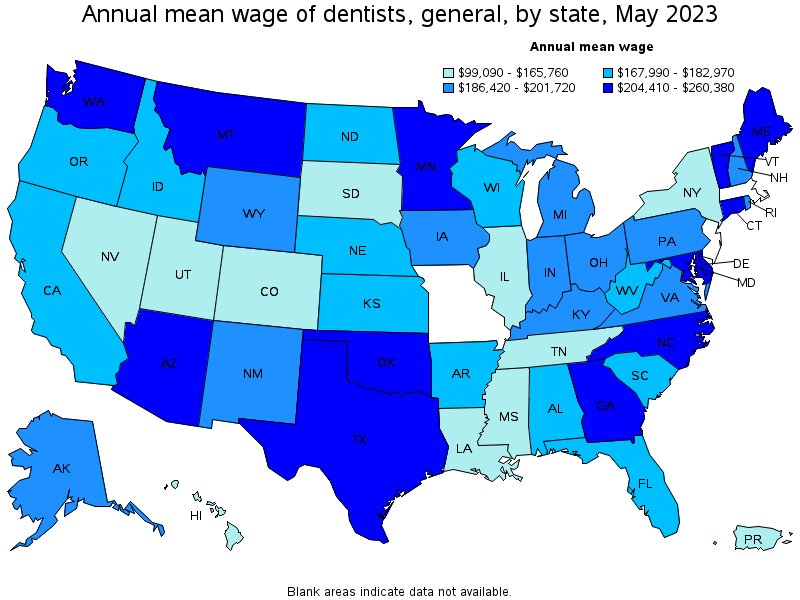Looking at things at the state level is not very helpful. Inner suburbs of Houston or Dallas are likely saturated, despite the fact that everyone lauds Texas as a great market. If you've ever been to the state of Virginia, the rural southwest portion of the state and the high income suburbs of DC are two different countries. The answer to what makes a market a good market are far more complex than what state the practice would be in. Even in states as geographically small as Connecticut, there are big differences between places that are an hour in the car from each other.
The question you should probably be asking is which metropolitan areas are saturated, and the answer to that is likely a lot of the large ones. Too many people who become dentists come from high SES and these areas, and want to live the same way/in the same area as they did growing up, and they pay the price in terms of income:living expense ratio. On the other hand, it takes a lot to move from metro San Francisco to a mid sized city in Iowa if you're used to what you're used to, and no amount of income:living expense ratio can make up for the difference.
To each their own.
EDIT: I guess what I'm trying to say is that there are hidden gems that meet the sweet spots of:
-affordable housing with decent public schools
-a large enough affluent population that is also willing to pay money for dental services
-not a glut of other dentists within close enough proximity for patients to easily find appointments elsewhere
-high labor force participation rates (for obvious reasons), but while it is risky if the company relocates if you find a place where there is a dominant employer in and industry that pays well and offers good insurance for its employees it could be a gold mine
In a general sense, avoid the bigger, more expensive suburbs in big metro areas like LA, NY, San Francisco, DC, perhaps Chicago (plenty of great suburbs further out), Miami, Boston.
In my young and not yet fully educated view, I would stick to mid sized cities in the upper Midwest or Mountain West, along with places like Knoxville, TN, Asheville and Charlotte, NC, parts of Delaware that are suburban Philly, Burlington, VT. Places where there are patients with money willling to give it to you and not manyother places to give it.
Sure, you could be a one person show in a very rural town of 10,000, isolated from other towns, but this may not suit your lifestyle. It also might.
Oh, southern New Hampshire is fantastic. Affluent, good schools, not too much competition, no state income tax (high property to compensate), proximity to Boston.
If I had to list places where I would go given my personal preferences, I would rank them as
-Burlington, VT area
-suburban southern New Hampshire
-Asheville, NC area
-Castle Rock, CO area (exploding population in the Front Range Corridor)
-suburban Philly northern Delaware
-Anchorage
Of course there are other places too

